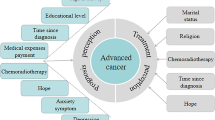Abstract
Cancer patients who start receiving chemotherapy have difficulty in understanding the state of their disease, the prognosis, and the purpose of treatment. We used a survey to evaluate the extent of perception of chemotherapy goal among cancer patients. Two hundred sixteen cancer patients who received chemotherapy for the first time participated in the study. The presence of depression and anxiety was assessed using the “Hospital Anxiety and Depression Scale” (HAD). The consistency between the patients’ perception of the chemotherapy goal and the physician’s perception was described as “right,” and the inconsistency was described as “wrong.” Among the patients who participated in the survey, 53.2 % (n = 115) were receiving adjuvant treatment and 46.8 % (n = 101) were receiving palliative treatment for metastatic disease. The rate of right and wrong perception of the chemotherapy goal was 51.9 % (n = 108) and 32.2 % (n = 67), respectively, and the rate of confused patients was 18.9 % (n = 41). The level of education was shown to be the only parameter involved in accurate perception of the treatment purpose (hazard ratio (HR) = 0.444, p = 0.025, 95 % confidence interval (CI) 0.219–0.903). In this study, there was a 51.9 % consistency between the physician’s perception and that of the patient regarding the purpose of treatment. We demonstrated that the level of education was the unique factor in accurate perception of chemotherapy goal among cancer patients.

Similar content being viewed by others
References
Mack JW, Wolfe J, Grier HE et al (2006) Communication about prognosis between parents and physicians of children with cancer: parent preferences and the impact of prognostic information. J Clin Oncol 24(33):5265–5270
Weeks JC, Cook EF, O'Day SJ et al (1998) Relationship between cancer patients’ predictions of prognosis and their treatment preferences. JAMA 279(21):1709–1714
Fried TR, Bradley EH, Towle VR et al (2002) Understanding the treatment preferences of seriously ill patients. N Engl J Med 346(14):1061–1066
Rose JH, O'Toole EE, Dawson NV et al (2004) Perspectives, preferences, care practices, and outcomes among older and middle-aged patients with late-stage cancer. J Clin Oncol 22(24):4907–4917
Zigmond AS, Snaith RP (1983) The hospital anxiety and depression scale. Acta Psychiatr Scand 67(6):361–370
Aydemir Ö, Güvenir T, Küey L (1997) The hospital anxiety and depression scale Hastane anksiyete ve depresyon ölçeği: the validity and reliability of the Turkish version. Türk Psikiyatri Dergisi 8:280–287
Roth AJ, Kornblith AB, Batel-Copel L et al (1998) Rapid screening for psychologic distress in men with prostate carcinoma: a pilot study. Cancer 82(10):1904–1908
National Comprehensive Cancer Network (2003) Distress management. Clinical practice guidelines. J Natl Compr Canc Netw 1(3):344–374
Lennes IT, Temel JS, Hoedt C et al (2013) Predictors of newly diagnosed cancer patients’ understanding of the goals of their care at initiation of chemotherapy. Cancer 119(3):691–699
Temel JS, Greer JA, Admane S et al (2011) Longitudinal perceptions of prognosis and goals of therapy in patients with metastatic non-small-cell lung cancer: results of a randomized study of early palliative care. J Clin Oncol 29(17):2319–2326
Temel JS, Greer JA, Muzikansky A et al (2010) Early palliative care for patients with metastatic non-small-cell lung cancer. N Engl J Med 363(8):733–742
Christakis NA (2000) Death foretold: prophecy and prognosis in medical care. University of Chicago Press, Chicago
Leydon GM, Boulton M, Moynihan C et al (2000) Faith, hope, and charity: an in-depth interview study of cancer patients’ information needs and information-seeking behavior. West J Med 173(1):26–31
Jenkins V, Fallowfield L, Saul J (2001) Information needs of patients with cancer: results from a large study in UK cancer centres. Br J Cancer 84(1):48–51
Back AL, Arnold RM (2006) Discussing prognosis: “how much do you want to know?” talking to patients who are prepared for explicit information. J Clin Oncol 24(25):4209–4213
Delvecchio Good MJ, Good BJ et al (1990) American oncology and the discourse on hope. Cult Med Psychiatry 14(1):59–79
Clayton JM, Butow PN, Arnold RM et al (2005) Fostering coping and nurturing hope when discussing the future with terminally ill cancer patients and their caregivers. Cancer 103(9):1965–1975
Christakis NA, Lamont EB (2000) Extent and determinants of error in doctors’ prognoses in terminally ill patients: prospective cohort study. BMJ 320(7233):469–472
Schofield PE, Butow PN, Thompson JF et al (2003) Psychological responses of patients receiving a diagnosis of cancer. Ann Oncol 14(1):48–56
Gattellari M, Voigt KJ, Butow PN et al (2002) When the treatment goal is not cure: are cancer patients equipped to make informed decisions? J Clin Oncol 20(2):503–513
Author information
Authors and Affiliations
Corresponding author
Rights and permissions
About this article
Cite this article
Gumusay, O., Cetin, B., Benekli, M. et al. Factors Influencing Chemotherapy Goal Perception in Newly Diagnosed Cancer Patients. J Canc Educ 31, 308–313 (2016). https://doi.org/10.1007/s13187-015-0827-y
Published:
Issue Date:
DOI: https://doi.org/10.1007/s13187-015-0827-y



